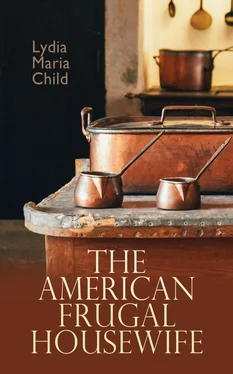Lydia Maria Child - The American Frugal Housewife
Здесь есть возможность читать онлайн «Lydia Maria Child - The American Frugal Housewife» — ознакомительный отрывок электронной книги совершенно бесплатно, а после прочтения отрывка купить полную версию. В некоторых случаях можно слушать аудио, скачать через торрент в формате fb2 и присутствует краткое содержание. Жанр: unrecognised, на английском языке. Описание произведения, (предисловие) а так же отзывы посетителей доступны на портале библиотеки ЛибКат.
- Название:The American Frugal Housewife
- Автор:
- Жанр:
- Год:неизвестен
- ISBN:нет данных
- Рейтинг книги:3 / 5. Голосов: 1
-
Избранное:Добавить в избранное
- Отзывы:
-
Ваша оценка:
- 60
- 1
- 2
- 3
- 4
- 5
The American Frugal Housewife: краткое содержание, описание и аннотация
Предлагаем к чтению аннотацию, описание, краткое содержание или предисловие (зависит от того, что написал сам автор книги «The American Frugal Housewife»). Если вы не нашли необходимую информацию о книге — напишите в комментариях, мы постараемся отыскать её.
The American Frugal Housewife — читать онлайн ознакомительный отрывок
Ниже представлен текст книги, разбитый по страницам. Система сохранения места последней прочитанной страницы, позволяет с удобством читать онлайн бесплатно книгу «The American Frugal Housewife», без необходимости каждый раз заново искать на чём Вы остановились. Поставьте закладку, и сможете в любой момент перейти на страницу, на которой закончили чтение.
Интервал:
Закладка:
The writer has no apology to offer for this cheap little book of economical hints, except her deep conviction that such a book is needed. In this case, renown is out of the question, and ridicule is a matter of indifference.
The information conveyed is of a common kind; but it is such as the majority of young housekeepers do not possess, and such as they cannot obtain from cookery books. Books of this kind have usually been written for the wealthy: I have written for the poor. I have said nothing about rich cooking; those who can afford to be epicures will find the best of information in the 'Seventy-five Receipts.' I have attempted to teach how money can be saved , not how it can be enjoyed . If any persons think some of the maxims too rigidly economical, let them inquire how the largest fortunes among us have been made. They will find thousands and millions have been accumulated by a scrupulous attention to sums 'infinitely more minute than sixty cents.'
In early childhood, you lay the foundation of poverty or riches, in the habits you give your children. Teach them to save everything—not for their own use, for that would make them selfish—but for some use. Teach them to share everything with their playmates; but never allow them to destroy anything.
I once visited a family where the most exact economy was observed; yet nothing was mean or uncomfortable. It is the character of true economy to be as comfortable and genteel with a little, as others can be with much. In this family, when the father brought home a package, the older children would, of their own accord, put away the paper and twine neatly, instead of throwing them in the fire, or tearing them to pieces. If the little ones wanted a piece of twine to play scratch-cradle, or spin a top, there it was, in readiness; and when they threw it upon the floor, the older children had no need to be told to put it again in its place.
The other day, I heard a mechanic say, 'I have a wife and two little children; we live in a very small house; but, to save my life, I cannot spend less than twelve hundred a year.' Another replied, 'You are not economical; I spend but eight hundred.' I thought to myself—'Neither of you pick up your twine and paper.' A third one, who was present, was silent; but after they were gone, he said, 'I keep house, and comfortably too, with a wife and children, for six hundred a year; but I suppose they would have thought me mean, if I had told them so.' I did not think him mean; it merely occurred to me that his wife and children were in the habit of picking up paper and twine.
Economy is generally despised as a low virtue, tending to make people ungenerous and selfish. This is true of avarice; but it is not so of economy. The man who is economical, is laying up for himself the permanent power of being useful and generous. He who thoughtlessly gives away ten dollars, when he owes a hundred more than he can pay, deserves no praise—he obeys a sudden impulse, more like instinct than reason: it would be real charity to check this feeling; because the good he does maybe doubtful, while the injury he does his family and creditors is certain. True economy is a careful treasurer in the service of benevolence; and where they are united respectability, prosperity and peace will follow.
ODD SCRAPS FOR THE ECONOMICAL.
Table of Contents
If you would avoid waste in your family, attend to the following rules, and do not despise them because they appear so unimportant: 'many a little makes a mickle.'
Look frequently to the pails, to see that nothing is thrown to the pigs which should have been in the grease-pot.
Look to the grease-pot, and see that nothing is there which might have served to nourish your own family, or a poorer one.
See that the beef and pork are always under brine; and that the brine is sweet and clean.
Count towels, sheets, spoons, &c. occasionally; that those who use them may not become careless.
See that the vegetables are neither sprouting nor decaying: if they are so, remove them to a drier place, and spread them.
Examine preserves, to see that they are not contracting mould; and your pickles, to see that they are not growing soft and tasteless.
As far as it is possible, have bits of bread eaten up before they become hard. Spread those that are not eaten, and let them dry, to be pounded for puddings, or soaked for brewis. Brewis is made of crusts and dry pieces of bread, soaked a good while in hot milk, mashed up, and salted, and buttered like toast. Above all, do not let crusts accumulate in such quantities that they cannot be used. With proper care, there is no need of losing a particle of bread, even in the hottest weather.
Attend to all the mending in the house, once a week, if possible. Never put out sewing. If it be impossible to do it in your own family, hire some one into the house, and work with them.
Make your own bread and cake. Some people think it is just as cheap to buy of the baker and confectioner; but it is not half as cheap. True, it is more convenient; and therefore the rich are justifiable in employing them; but those who are under the necessity of being economical, should make convenience a secondary object. In the first place, confectioners make their cake richer than people of moderate income can afford to make it; in the next place, your domestic, or yourself, may just as well employ your own time, as to pay them for theirs.
When ivory-handled knives turn yellow, rub them with nice sand paper, or emery; it will take off the spots, and restore their whiteness.
When a carpet is faded, I have been told that it may be restored, in a great measure, (provided there be no grease in it,) by being dipped into strong salt and water. I never tried this; but I know that silk pocket handkerchiefs, and deep blue factory cotton will not fade, if dipped in salt and water while new.
An ox's gall will set any color—silk, cotton, or woollen. I have seen the colors of calico, which faded at one washing, fixed by it. Where one lives near a slaughterhouse, it is worth while to buy cheap, fading goods, and set them in this way. The gall can be bought for a few cents. Get out all the liquid, and cork it up in a large phial. One large spoonful of this in a gallon of warm water is sufficient. This is likewise excellent for taking out spots from bombazine, bombazet, &c. After being washed in this, they look about as well as when new. It must be thoroughly stirred into the water, and not put upon the cloth. It is used without soap. After being washed in this, cloth which you want to clean should be washed in warm suds, without using soap.
Tortoise shell and horn combs last much longer for having oil rubbed into them once in a while.
Indian meal and rye meal are in danger of fermenting in summer; particularly Indian. They should be kept in a cool place, and stirred open to the air, once in a while. A large stone, put in the middle of a barrel of meal, is a good thing to keep it cool.
The covering of oil-flasks, sewed together with strong thread, and lined and bound neatly, makes useful tablemats.
A warming-pan full of coals, or a shovel of coals, held over varnished furniture, will take out white spots. Care should be taken not to hold the coals near enough to scorch; and the place should be rubbed with flannel while warm.
Spots in furniture may usually be cleansed by rubbing them quick and hard, with a flannel wet with the same thing which took out the color; if rum, wet the cloth with rum, &c. The very best restorative for defaced varnished furniture, is rotten-stone pulverized, and rubbed on with linseed oil.
Sal-volatile, or hartshorn, will restore colors taken out by acid. It may be dropped upon any garment without doing harm.
Читать дальшеИнтервал:
Закладка:
Похожие книги на «The American Frugal Housewife»
Представляем Вашему вниманию похожие книги на «The American Frugal Housewife» списком для выбора. Мы отобрали схожую по названию и смыслу литературу в надежде предоставить читателям больше вариантов отыскать новые, интересные, ещё непрочитанные произведения.
Обсуждение, отзывы о книге «The American Frugal Housewife» и просто собственные мнения читателей. Оставьте ваши комментарии, напишите, что Вы думаете о произведении, его смысле или главных героях. Укажите что конкретно понравилось, а что нет, и почему Вы так считаете.












